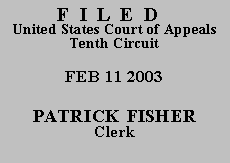

| UNITED STATES OF AMERICA, |
96-CR-10076-MLB |
In order for this court to grant a certificate of appealability (COA), Mr. Willner must make a "substantial showing of the denial of a constitutional right." 28 U.S.C. § 2253(c)(2). He must demonstrate "that reasonable jurists could debate whether (or, for that matter, agree that) the petition should have been resolved in a different manner or that the issues presented were adequate to deserve encouragement to proceed further." Slack v. McDaniel, 529 U.S. 473, 484 (2000) (quotations omitted). Where the district court denied a claim on procedural grounds, he must show that that jurists of reason would find the district court's procedural ruling debatable, and that the underlying constitutional claims are likewise debatable. Id. at 484-85.
The district court determined that a sufficiency of the evidence claim could not constitute a basis for § 2255 relief, relying upon Williams v. United States, 371 F.2d 536, 536 (10th Cir. 1967). While this is ordinarily true, a defendant may show cause and prejudice, or a fundamental miscarriage of justice to overcome the procedural bar of not having raised sufficiency on direct appeal. See United States v. Frady, 456 U.S. 152, 167-68 (1982); Santoro v. United States, 187 F.3d 14, 16 (1st Cir. 1999); Wright v. United States, 139 F.3d 551, 553 (7th Cir. 1998). Here, Mr. O'Bryan's sufficiency of the evidence claims are procedurally barred for failure to raise them on direct appeal, and he has not shown cause and prejudice, or a fundamental miscarriage of justice that would excuse that bar. As the district court noted, it is abundantly clear that a bank teller could testify to the bank's insured status. United States v. Bindley, 157 F.3d 1235, 1239 (10th Cir. 1998); see also United States v. Guerrero, 169 F.3d 933, 944 (5th Cir. 1999) (bank security officer testified bank is federally insured). With our addition, and after careful review of Mr. O'Bryan's briefs and the record, for substantially the reasons set forth in the district court's order, we DENY a COA, and DISMISS the appeal.
Entered for the Court
Paul J. Kelly, Jr.
Circuit Judge
*. This order and judgment is not binding precedent, except under the doctrines of law of the case, res judicata, and collateral estoppel. This court generally disfavors the citation of orders and judgments; nevertheless, an order and judgment may be cited under the terms and conditions of 10th Cir. R. 36.3.
2. After examining the briefs and the appellate record, this three-judge panel has determined unanimously that oral argument would not be of material assistance in the determination of this appeal. See Fed. R. App. P. 34(a); 10th Cir. R. 34.1(G). The case is therefore ordered submitted without oral argument.